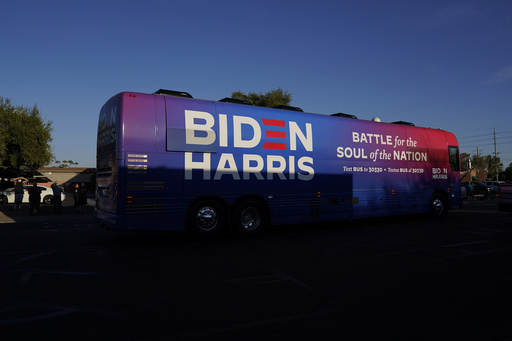A Texas jury is currently deliberating on whether a group of supporters of then-President Donald Trump engaged in aggressive behavior towards former Democratic lawmaker Wendy Davis and two others on a Biden-Harris campaign bus in 2020. This incident occurred when a “Trump Train” surrounded and slowed down the bus for more than an hour on a Texas highway close to the 2020 election.
The trial started on September 9 and is set to continue for another week as both sides present their arguments. The plaintiffs’ attorneys claim that six of the Trump Train drivers violated state and federal laws through their actions, while the defendants’ lawyers argue that they did not conspire against the Democrats and that their behavior was protected as free speech.
The confrontation took place on October 30, 2020, when dozens of vehicles from a local Trump Train group swarmed the campaign bus as it traveled from San Antonio to Austin on the final day of early voting in Texas. Video evidence showed trucks with large Trump flags surrounding the bus, causing it to slow down significantly and disrupt traffic flow.
During this incident, individuals on the bus, including Wendy Davis, a campaign staffer, and the driver, contacted 911 for assistance and a police escort in San Marcos. However, no law enforcement arrived, prompting the campaign to cancel the event and proceed to Austin. San Marcos later settled a separate lawsuit filed by the three Democrats, agreeing to pay $175,000 and implement political violence training for law enforcement.
Davis testified that she felt like she was being held hostage and sought treatment for anxiety following the ordeal. She also mentioned intimidation, harassment, and death threats received by Democrats in the days leading up to the incident.
The plaintiffs argue that the convoy organizers strategically targeted the bus to intimidate the Democrats, violating the “Ku Klux Klan Act” of 1871, which prohibits political violence and intimidation. On the other hand, the defense claims that their actions were part of a political rally and protected under free speech rights, rejecting allegations of a conspiracy to intimidate.
The defense’s bid to have the case dismissed without a trial was not successful, with the judge emphasizing that actions involving assault, intimidation, or imminent threats are not protected forms of expression. The trial outcome will determine the legal consequences for the drivers and organizers involved in the Trump Train incident with the Biden-Harris campaign bus in Texas.


